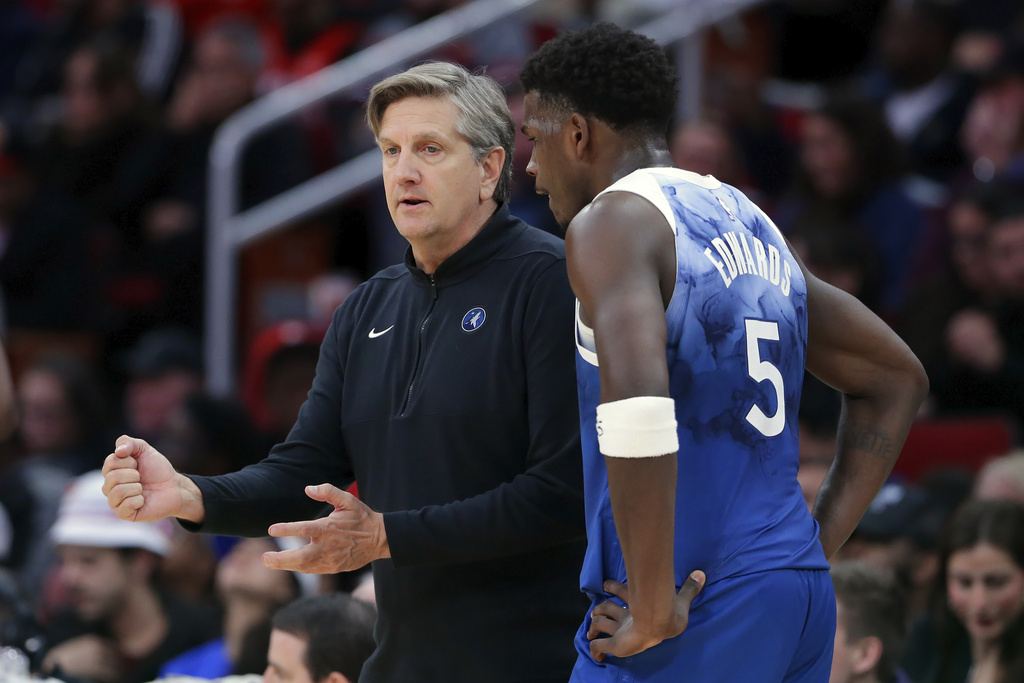
Tough, but fair: Timberwolves players always respond well to Chris Finch’s criticism
The Timberwolves showed a strong resiliency Friday in Houston, responding to their first two-game losing streak of the season by not only beating the Rockets, but doing so in resounding fashion by righting so many of their wrongs from the past couple weeks.
The ball stopped sticking on offense and Minnesota again sported the hounding defense everyone grew accustomed to watching over the first two months of the season.
Wolves man big Naz Reid said players “had a great mindset going into the game.
“Coach had a talk with us,” he told reporters, “and we all were ready to play.”
What was the message of the chat between Timberwolves bench boss Chris Finch and his players?
“Just bring it,” Reid said. “We kind of haven’t been ourselves the last couple of games. Intensity has been low. Pop has been low. Just things of that nature.”
These are messages Finch has delivered for two weeks now during the Timberwolves’ slippage in their level of play since Christmas. He admitted recently that his players get “a little tired of hearing me at times.”
“But we’ve got to stay on these things,” Finch said.
So the solution was to take a different approach before Friday’s game in Houston. Rather than delivering another soliloquy, Finch turned on the film. And no, it wasn’t film of Minnesota’s recent struggles.
“He showed us a bunch of clips, probably like 10 to 12 clips of us just flying around, being big, protecting the rim,” guard Anthony Edwards said. “It was a good thing to see, for sure.”
“We went through a couple of clips that showed us, as a group, how we are with our best basketball,” Reid said. “I think that kind of sparked a momentum (Friday).”
What better way to get a team to revert to its ideal identity than to remind the players of exactly what that identity is and the success it brings.
It was just the latest example of Finch’s successful communication. He’s a hard-nosed coach in the sense that no one gets away with anything. Finch has called out star players —Edwards and Karl-Anthony Towns, specifically — in recent days, citing the needed improvement of their decision-making that had stagnated the offense.
He was relentless a year ago in insisting that players needed better effort and buy-in if the Timberwolves were to take a step forward as a team.
“If you were (not bringing it), they were telling you you were (not bringing it),” center Rudy Gobert recalled. “I think it’s really important if you want to build a championship-caliber team to have that type of relationship.”
That has continued this season, even through the successes. Finch has consistently cited areas of needed improvement, even during the best stretches.
“I’ve been impressed with him. He hasn’t, not one day, changed. He hasn’t thought about how good we’ve done. Everything I’ve seen on the film has been negative, from Day 1,” veteran guard Mike Conley said in early December, just prior to Finch being named the Western Conference Coach of the Month in November. “In the most perfect of games, he finds 20 clips of us doing something wrong and ripping us for those clips. He’s keeping us humble, keeping us locked in and focused on each day.”
And when things went a little wayward — even when the Wolves were winning ugly in recent weeks — Finch was the first one to call them out. He went as far as to recently call his first-place team “average.” The coach calls it how he sees it, and lays out what needs to change for things to improve. He delivers similar messages publicly as he does privately. So fans, players and coaches can all be on the same page.
That’s all great. But more impressive is the way in which those lessons are communicated to players. As critical as Finch can be, he never loses the locker room.
Part of that is again a credit to the group of players basketball boss Tim Connelly has assembled. They’re largely team-first players who are coachable and willing to adapt to help the Wolves win.
But Finch and his staff have also built up credibility and rapport across the roster that allows players to know the coaches are operating with the team’s best interest in mind, and that there will be actions taken if you don’t do things the right way on the court.
Even when someone does act out, such as when Edwards recently refused to sub out of a game in the final minute of a first half, situations are handled swiftly.
“It’s been addressed and there will be no more comment about it,” Finch said postgame.
Because Edwards addressed it in front of the entire team after the game.
“That was my fault. Never want to do that to Finchy. Man, he’s a great coach. We talked about it,” Edwards said. “He knows I love him, he loves me. He told me at halftime. We talked about it. I wanted to stay in. I wanted the last shot of the half or be able to create the last shot, and his reasoning was he didn’t want me to get a fourth foul or anything. Which he was right. So that was my fault.”
No beef, no lingering arguments.
Like every situation that arises in Minnesota, from incidents to poor play, it was immediately handled and corrected by a coach using upfront, open, honest communication.
And maybe the occasional film clip.
Related Articles
Timberwolves respond to first losing skid in resounding fashion in win over Rockets
Timberwolves got complacent. They have to regain their edge
Timberwolves suffer consecutive losses for first time, falling to Pelicans
Rudy Gobert’s nice gesture leads to big thank you
For Timberwolves, it’s Jordan McLaughlin time

